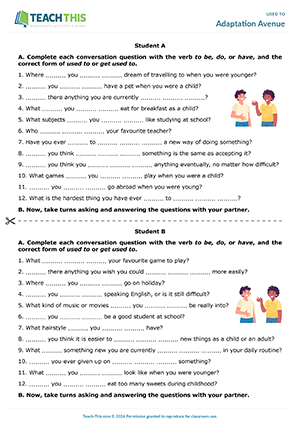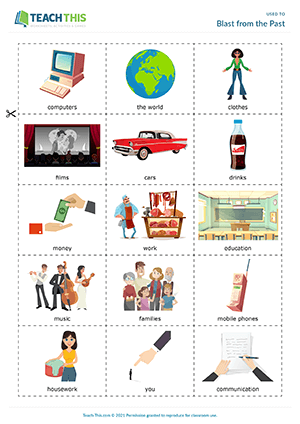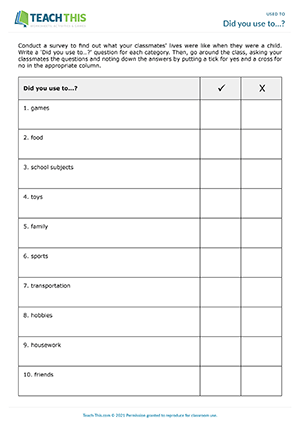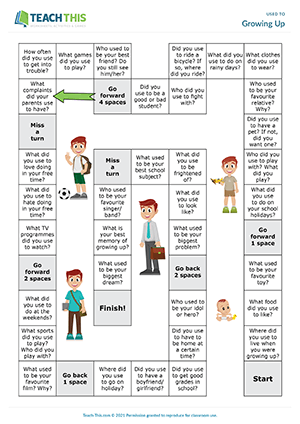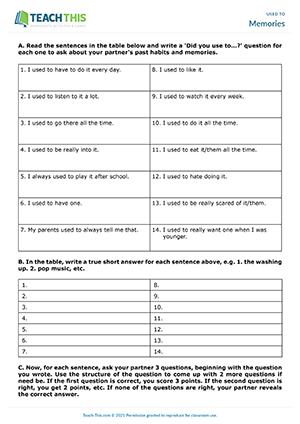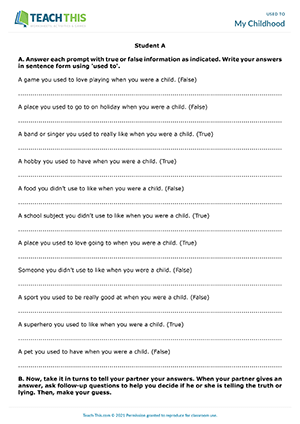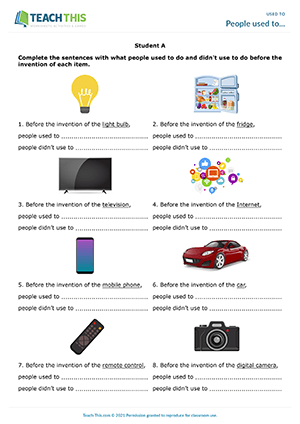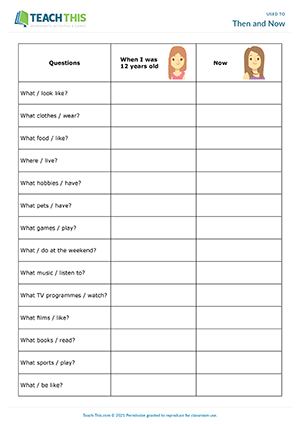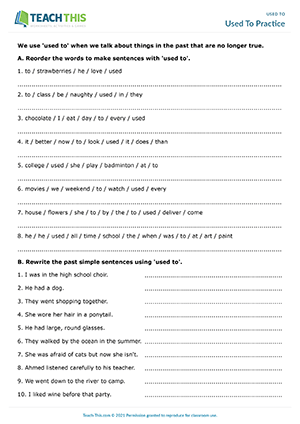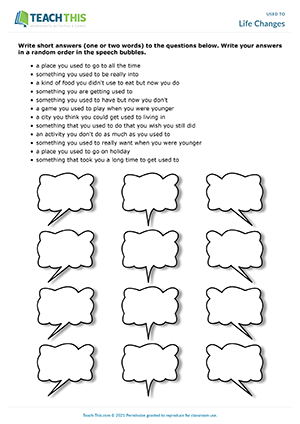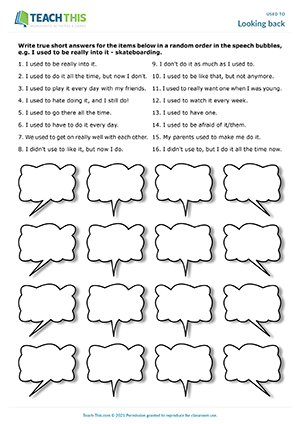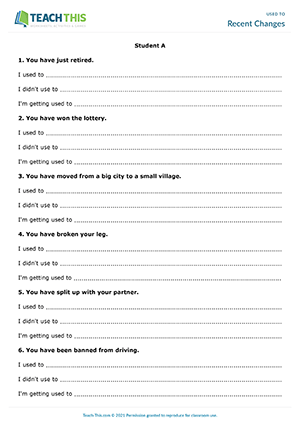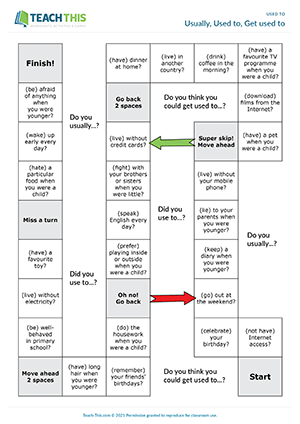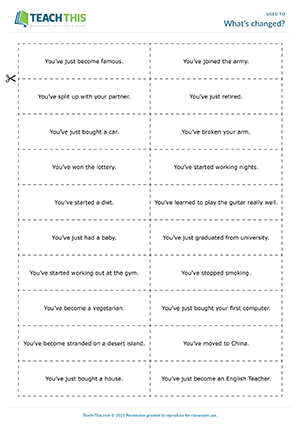In this handy used to speaking activity, students practice forming, asking and answering used to and get used to conversation questions. First, in two groups, students complete each conversation question with the verb to be, do, or have, and the correct form of used to or get used to. Students then pair up with someone from the other group and take turns asking and answering the used to conversation questions with their partner. Afterwards, students share what they found out about their partner with the class.
In this imaginative used to game, students talk about how things were different in the past using used to and didn't use to. In groups, students take turns picking up a card (e.g. computers) and talking about the topic on the card for 30 seconds, saying how the thing was different in the past, e.g. 'Computers used to have floppy disks. The monitors didn't use to be flat like they are today, etc…' For every sentence with used to and didn't use to the student makes, they score one point. The student with the most points at the end of the game is the winner.
In this engaging used to speaking activity, students conduct a survey to find out what their classmates' lives were like as children by asking and answering Did you use to...? questions. First, students write a suitable Did you use to…? question for each category. For example, in the games category, a student might write 'Did you use to play hide and seek as a child?' Next, students go around the class, asking each other their questions and noting down the answers by putting a small tick for yes or a cross for no in the appropriate column. Finally, students report their findings to the class.
In this free used to board game, students practice used to and the past simple by discussing and answering questions about childhood memories. The game is ideal for teenagers or adults and provides students with a great opportunity to practice building a conversation about growing up. Players take turns rolling the dice and moving their counter along the board. When a player lands on a square, the student on their right asks them the question on the square about their experience of growing up. The player then uses used to and the past simple to answer the question. Next, the group explores the topic by asking follow-up questions and giving comments. The first player to reach the finish wins the game.
In this insightful used to game, students guess a partner's answers to I used to... sentences about their childhood by asking Did you use to...? questions. First, students read I used to... sentences, think about their childhood and write a true short answer for each one, e.g. 'I used to have to do it every day.' Answer: the washing up. Students then try to guess what their partner wrote by writing a Did you use to...? question for each sentence, e.g. 'Did you use to have to do your homework every day?' Next, students take turns asking each Did you use to...? question to their partner, who responds Yes, I did or No, I didn't accordingly. If the first question is right, the student scores three points. If not, the student guesses again by asking another Did you use to...? question for two points and then one more for one point. If none of the questions are right, their partner reveals the correct answer. The student with the most points at the end of the game wins.
In this amusing used to game, students give true and false information about their childhood. First, in two groups, students answer each prompt with true or false information as indicated, writing their answers in sentence form with used to. Next, students pair up with someone from the other group and take turns reading each used to statement to their partner, e.g. 'I used to love playing chess when I was a child.' Their partner then asks follow-up questions to help them decide whether the answer is true or false. Their partner then guesses if the student is lying or telling the truth and the correct answer is revealed. If their partner guesses correctly, they score a point. The student with the most points at the end of the game wins.
In this fun used to game, students guess inventions by listening to a partner talk about what people used to do and didn't use to do before they existed. First, in two groups, students complete sentences with what people used to do and didn't use to do before the invention of each item on their worksheet. Next, students pair up with someone from the other group and take turns reading their sentences to their partner using the word 'blank' for the underlined invention, e.g. 'Before the invention of the 'blank', people used to...' Their partner then has three chances to guess the invention. For each correct guess, students score a point. If their partner is having trouble guessing, students make more sentences with used to and didn't use to until they have had three guesses. The student with the most points at the end of the game wins.
In this free used to vs. present simple activity, students ask and answer questions about the way things used to be when they were 12 and the way things are now. First, students answer questions about when they were 12 years old. Go through the did you use to questions from the prompts with the class, e.g. 'What did you use to look like when you were 12 years old?' Students then write answers to the questions under the heading, writing their answers in sentence form using used to, e.g. 'I used to have long brown hair and spots.' Next, students answer questions about how they are now. Go through the question prompts again with the class, but this time using the present simple, e.g. 'What do you look like now?' Students then write answers to the questions under the heading 'Now' using the present simple, e.g. 'Now, I have short blonde hair, and I wear make-up.' In pairs, students then take turns asking and answering the questions about the way things used to be when they were 12 and the way things are now. Finally, students tell the class about how their partner has changed.
In this productive used to worksheet, students practice forms of used to in affirmative and negative statements and Wh questions. To begin, students reorder words to form sentences with used to. Students then rewrite past simple sentences using used to. Next, students use verbs from a box to write negative didn't use to sentences. After that, students use prompts to make Wh questions with did you use to. Finally, students ask and answer the questions with a partner.
This interesting used to speaking activity is ideal for practicing or reviewing the various forms of used to, e.g. get used to, getting used to, etc. In the activity, students ask and answer questions about the past and present using the various forms. First, students answer questions on their worksheet by writing short answers in a random order in speech bubbles. Next, students exchange worksheets with a partner. Students then take turns choosing an answer from one of their partner's speech bubbles and asking them questions to find out what the answer refers to. For example, if a student wrote the word 'beach' in one of the speech bubbles, their partner might ask 'Did you use to visit the beach frequently? The student replies yes or no accordingly. When a student asks the right question, their partner explains their answer. After the answer has been explained and discussed, the student puts a tick next to the bubble, and students swap roles. Afterwards, students report back to the class on the most interesting things they found out about their partner.
In this memorable used to speaking activity, students practice expressions with used to and would by talking about past habits and memories. Students begin by writing true short answers for the items on the worksheet in a random order in the speech bubbles, e.g. I used to be deeply passionate about it - skateboarding. Next, students swap worksheets with a partner. Students then take turns choosing an answer from one of their partner's speech bubbles and asking them to talk about it, e.g. 'Tell me about skateboarding.' Their partner uses the expression with used to to talk about the topic, e.g. 'I used to be deeply passionate about skateboarding. I would go to the skate park every day and practice for hours.' The student then asks follow-up questions and the pair develops a short conversation about the topic. After their partner has explained the answer and it's been discussed, the student puts a tick next to the speech bubble, and the students swap roles. Finally, students report back to the class on the most interesting things they found out about their partner.
In this entertaining used to game, students practice used to, didn't use to and getting used to by guessing situations from recent changes. The worksheet shows recent changes in the student's life. The students' task is to write sentences about what they used to do, didn't use to do, and what they are getting used to, regarding each situation. In two groups, students complete the sentences in a way that is appropriate for each situation. Next, students pair up with someone from the other group and take turns reading out the three sentences for each situation. Their partner has three chances to guess the situation. For each correct guess, students score a point. The student with the most points at the end of the game wins.
Here is a fun used to board game to help students ask and answer questions about things they usually do, used to do, or could/couldn’t get used to doing. In pairs, students take turns rolling the dice and moving their counter along the board. When a student lands on a square, they form a question from the prompt on the square with either Do you usually...?, Did you use to...? or Do you think you could get used to...? The student then asks the question to their partner who answers accordingly. If the question is formed correctly, the student stays on the square. If not, the student moves back two squares. The first student to reach the finish wins the game.
In this free used to and would game, students describe and guess changes that have happened using used to, didn't use to, getting used to, would and wouldn't. Each card shows a change that has happened in the student's life. The students' task is to form sentences that demonstrate that change using used to, didn’t use to, getting used to, would and wouldn’t. Students take turns choosing one of their cards and making sentences, describing the change on the card using forms of used to and would. The other students listen and try to guess the change. The first student to guess correctly wins the card. The student with the most cards at the end of the game wins.
Latest Free
Resources
- Call and Respond
Business - Telephoning (B1)
Date Added: 24th of March
- Small Talk Techniques
Small Talk (B1)
Date Added: 20th of March
- Jigsaw Reading
Reading Exam Preparation (B1)
Date Added: 7th of March
- Writing Jeopardy
Writing Exam Preparation (B1)
Date Added: 6th of March
- Present Perfect Bingo
Present Perfect Yes No Questions (A2)
Date Added: 4th of March
Latest Member
Resources
- Please hold for a moment
Business - Telephoning (B2)
Date Added: 4th of April
- A Day out in Tokyo
Describing Places (A2)
Date Added: 1st of April
- Who Went Where?
Past Simple Wh Questions (A2)
Date Added: 1st of April
- Identifying Bias
Critical Thinking (B2)
Date Added: 31st of March
- Perfect Punctuation
Writing Exam Preparation (B1)
Date Added: 27th of March



